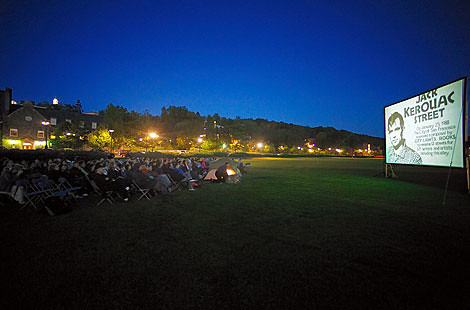art = surprising + inevitable.
Written in blue crayon, this short equation ŌĆö scribbled by an attendee of the 54th Robert Flaherty Film Seminar ŌĆö joined other drawings and notes on the walls of an informal lounge set up in Clifford Gallery on the ║┌┴Ž═° campus.
The seminar attracted artists and scholars from around the world, and this year three film and media studies minors, Allison Ewing ŌĆÖ08, Jina Chung ŌĆÖ08, and Adam Hughes ŌĆÖ10, had the opportunity to take part in the prestigious event (named for the famed American documentary filmmaker).
 |
| The Robert Flaherty Film Seminar offered public screenings for the first time in its history, to the delight of professors Lynn Schwarzer and John Knecht, who helped organize the event. My AmericaŌĆ” or Honk if You Love Buddha was shown outside June 24 in front of an appreciative audience at Whitnall Field. (Photo by Andrew Daddio) |
ŌĆ£It was so completely and totally engrossing,ŌĆØ said Ewing, ŌĆ£The first screening was at 9 a.m. and the last ended close to 11 p.m. With so many artists and scholars present, you were just always ŌĆśonŌĆÖ. Everyone was completely focused on learning about and experiencing the art.ŌĆØ
Under the theme, ŌĆ£The Age of Migration,ŌĆØ seminar-goers explored the personal and cultural by-products of migration, conflict, and information technology, and the film movements that have emerged as a result. Each screening was followed by discussion.
ŌĆ£The screenings work in a totally different way,ŌĆØ Ewing commented. ŌĆ£We didnŌĆÖt know what we were sitting down to watch until it was playing on the screen. It was a total surprise.ŌĆØ
|
Withholding information about a film until after it had been screened, she explained, served to thwart any preconceptions and prejudgments the audience might have.
Ewing and Chung attended the seminar thanks to a grant from NITLE, a nonprofit initiative dedicated to promoting liberal education, while Hughes worked as an intern for the Flaherty.
Chung was particularly struck by Silvia Schedelbauer, a German-Japanese filmmaker whose work deals with intercultural issues, feminism, internationalism, and identity politics.
ŌĆ£Her work based on her intercultural background was extremely interesting; this feeling of belonging to different worlds and at the same time not belonging in either,ŌĆØ explained Chung.
Ewing said she felt privileged to see a film by Kurdish filmmaker Bahman Ghobadi, and became inspired with ideas for her own videos.
ŌĆ£IŌĆÖve been learning a lot about world situations and human migration,ŌĆØ she said, ŌĆ£and this has been a great exposure to really politically charged material.ŌĆØ
Hughes noted how much he learned from the open and sometimes-heated discussions that followed screenings and from working with the seminar projectionist.
Chung said the seminar, held June 21-27, broadened her thinking about documentary filmmaking.
ŌĆ£What IŌĆÖve gotten to see has completely changed what I thought the genre was,ŌĆØ she explained. ŌĆ£There are so many styles and variations. ItŌĆÖs extremely refreshing.ŌĆØ